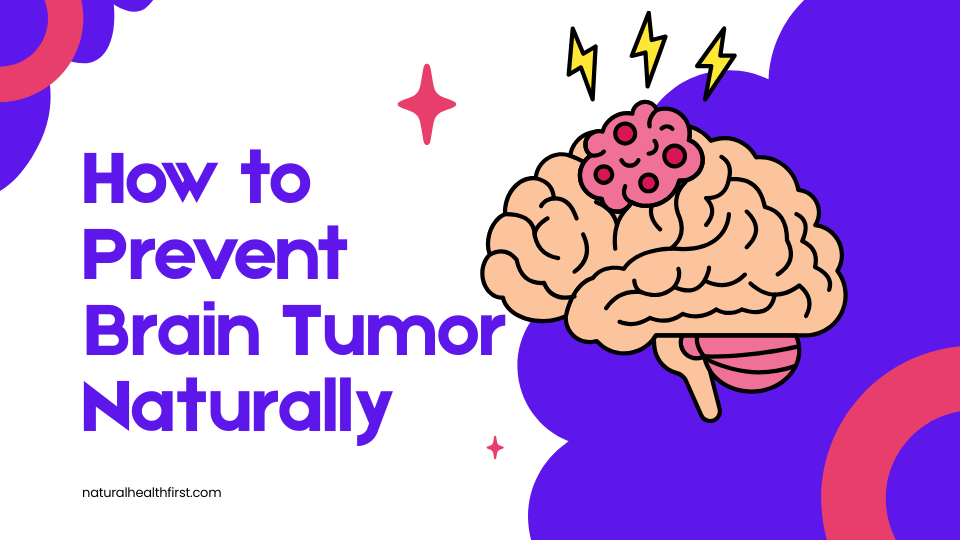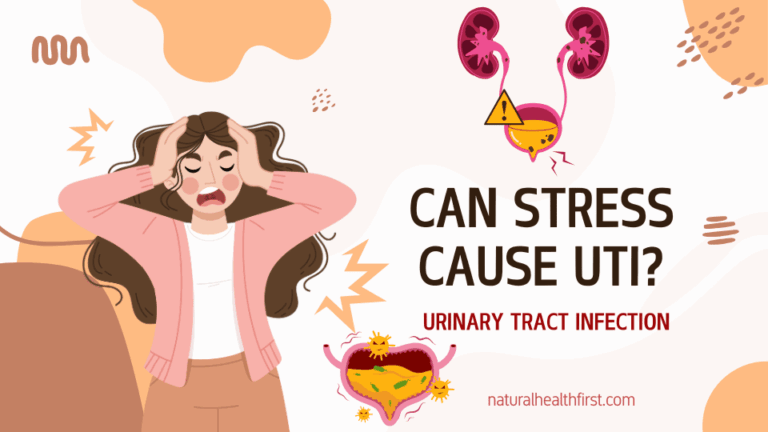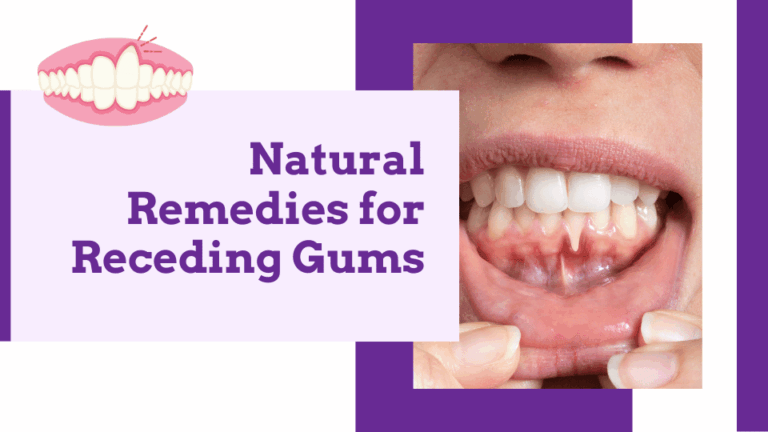Prevent Brain Tumor Naturally: Brain tumors remain one of medicine’s most challenging diagnoses, affecting thousands of people worldwide each year. While genetics play a role in some cases, mounting research suggests that lifestyle factors and environmental exposures significantly influence brain tumor risk. As a naturopathic physician, I’ve witnessed firsthand how preventive strategies can support brain health and potentially reduce tumor development risk.
The human brain, with its intricate network of billions of neurons, deserves our utmost protection. Unlike other organs, the brain cannot regenerate damaged tissue as effectively, making prevention absolutely crucial. This comprehensive guide explores evidence-based natural approaches to brain tumor prevention, drawing from both traditional naturopathic wisdom and modern scientific research.
Brain Tumor Risk Factors
Before going to know about prevention strategies, it’s essential to understand what increases brain tumor risk. Both modifiable and non-modifiable factors contribute to tumor development.
Non-modifiable risk factors include:
- Age (risk increases with advancing years)
- Gender (certain types affect men or women more frequently)
- Genetic predisposition and family history
- Previous radiation therapy to the head
Modifiable risk factors present opportunities for intervention:
- Environmental toxin exposure
- Dietary patterns and nutritional deficiencies
- Chronic inflammation
- Compromised immune function
- Excessive electromagnetic field exposure
- High stress levels and poor sleep quality
The encouraging news is that many risk factors fall within our control. By addressing these modifiable elements through natural approaches, we can create an environment less conducive to abnormal cell growth.
Also Read: How to Prevent Root Canal Treatment
Environmental Exposures and Brain Tumor Risk
Our modern environment presents unprecedented challenges to brain health. Chemical pollutants, electromagnetic radiation, and toxic substances surround us daily, requiring conscious effort to minimize exposure.
Reducing Chemical Exposure
Industrial chemicals and pesticides have been linked to increased brain tumor risk in numerous studies. These substances can cross the blood-brain barrier, potentially triggering cellular changes that lead to tumor formation.
Practical steps to reduce chemical exposure:
- Choose organic produce whenever possible, especially for the “Dirty Dozen” fruits and vegetables
- Use natural cleaning products free from harsh chemicals
- Filter your drinking water to remove chlorine, fluoride, and other contaminants
- Avoid plastic food containers, especially when heating food
- Select personal care products without parabens, phthalates, and synthetic fragrances
- Install air purifiers in your home and workplace
- Choose furniture and building materials with low volatile organic compound (VOC) emissions
Avoiding Radiation Exposure
Ionizing radiation represents a well-established brain tumor risk factor. While we cannot eliminate all radiation exposure, we can significantly reduce unnecessary exposure through mindful choices.
Strategies to minimize radiation exposure:
- Limit unnecessary medical imaging procedures
- Use hands-free devices for cell phone conversations
- Keep electronic devices away from your head during sleep
- Choose wired internet connections over Wi-Fi when possible
- Avoid living near high-voltage power lines or cell towers
- Consider radiation-blocking phone cases and computer shields
Diet to Prevent Brain Tumors
Nutrition plays a fundamental role in brain tumor prevention. A well-designed anti-cancer diet provides essential nutrients while avoiding substances that promote tumor growth.
Anti-Cancer Nutrients and Foods
Certain compounds demonstrate remarkable ability to protect against abnormal cell growth and support the body’s natural cancer-fighting mechanisms.
Cruciferous vegetables contain powerful compounds called glucosinolates, which break down into isothiocyanates – potent anti-cancer molecules. Include these vegetables daily:
- Broccoli and broccoli sprouts
- Cauliflower
- Brussels sprouts
- Kale and collard greens
- Cabbage and bok choy
Antioxidant-rich berries protect brain cells from oxidative damage:
- Blueberries (highest in anthocyanins)
- Blackberries and raspberries
- Goji berries
- Acai berries
Omega-3 fatty acids reduce inflammation and support healthy brain function:
- Wild-caught fatty fish (salmon, sardines, mackerel)
- Walnuts and flaxseeds
- Chia seeds
- High-quality fish oil supplements
Foods to Limit or Avoid
Certain dietary patterns may increase brain tumor risk by promoting inflammation, compromising immune function, or directly damaging brain cells.
Processed and cured meats contain nitrates and nitrites, which can form carcinogenic compounds:
- Hot dogs and sausages
- Bacon and ham
- Deli meats
- Processed chicken products
Refined sugars and artificial sweeteners fuel cancer cell growth and create metabolic dysfunction:
- High fructose corn syrup
- Aspartame and sucralose
- Refined white sugar
- Sugary beverages and snacks
Trans fats and damaged oils promote inflammation throughout the body:
- Margarine and shortening
- Fried foods from restaurants
- Packaged baked goods
- Processed snack foods
Specific Anti-Cancer Compounds
Several natural compounds demonstrate specific anti-tumor properties and deserve special attention in brain tumor prevention protocols.
Curcumin, the active compound in turmeric, shows remarkable ability to inhibit tumor growth and induce cancer cell death. Take 500-1000mg daily with black pepper for enhanced absorption.
Green tea polyphenols, particularly EGCG, provide powerful antioxidant protection and may prevent tumor formation. Drink 3-4 cups of high-quality green tea daily or take standardized extracts.
Resveratrol from grapes and berries activates longevity genes and demonstrates anti-cancer properties. Include dark-colored grapes, berries, and consider supplementation.

Lifestyle Changes to Avoid Brain Tumors
Beyond nutrition, comprehensive lifestyle modifications create an environment that supports brain health and reduces tumor risk.
Exercise and Brain Health
Regular physical activity provides multiple protective benefits against brain tumor development. Exercise increases blood flow to the brain, supports immune function, and reduces chronic inflammation.
Recommended exercise patterns:
- 150 minutes of moderate-intensity aerobic activity weekly
- Two strength training sessions per week
- Daily walking or gentle movement
- Yoga or tai chi for stress reduction
- High-intensity interval training 2-3 times weekly
Exercise also stimulates the production of brain-derived neurotrophic factor (BDNF), a protein that supports neuron health and may protect against tumor formation.
Stress Management and Sleep Quality
Chronic stress suppresses immune function and creates an internal environment conducive to tumor growth. Prioritizing stress management and quality sleep represents a cornerstone of natural brain tumor prevention.
Effective stress reduction techniques:
- Daily meditation or mindfulness practice
- Deep breathing exercises
- Regular nature exposure
- Journaling and emotional expression
- Social connection and community involvement
- Professional counseling when needed
Sleep optimization strategies:
- Maintain consistent sleep and wake times
- Create a dark, cool sleeping environment
- Avoid screens for 2 hours before bedtime
- Use blackout curtains and eye masks
- Consider natural sleep aids like melatonin or magnesium
- Address sleep disorders like sleep apnea promptly
Protecting Brain Health from Tumor Development
Comprehensive brain protection requires a multi-faceted approach addressing cellular health, detoxification, and immune support.
Supporting Detoxification Pathways
The body’s natural detoxification systems work continuously to eliminate potentially harmful substances. Supporting these pathways helps reduce the toxic burden that may contribute to tumor formation.
Liver support strategies:
- Consume bitter greens like dandelion and arugula
- Include sulfur-rich foods (garlic, onions, cruciferous vegetables)
- Take milk thistle or NAC supplements
- Ensure adequate B-vitamin intake
- Stay well-hydrated with clean water
Lymphatic system support:
- Practice dry skin brushing
- Use infrared saunas regularly
- Get lymphatic massage
- Perform rebounding exercises
- Stay active and avoid prolonged sitting
Immune System Optimization
A robust immune system can recognize and eliminate abnormal cells before they develop into tumors. Supporting immune function represents a critical component of brain tumor prevention.
Natural immune support methods:
- Consume immune-boosting mushrooms (shiitake, reishi, turkey tail)
- Take vitamin D3 supplements (maintain blood levels 50-80 ng/mL)
- Include zinc-rich foods and supplements
- Consume probiotic foods and supplements for gut health
- Get adequate vitamin C from whole food sources
- Practice moderate exercise (excessive exercise can suppress immunity)
Brain Tumor Prevention Through Nutrition
Specific nutritional protocols can provide targeted support for brain tumor prevention while addressing underlying metabolic imbalances.
Ketogenic Diet Considerations
Emerging research suggests that ketogenic diets may help prevent brain tumors by depriving potential cancer cells of their preferred fuel source – glucose. Cancer cells typically rely heavily on glucose for energy and may struggle to use ketones effectively.
Modified ketogenic approach for prevention:
- Focus on healthy fats (avocados, olive oil, nuts, seeds)
- Include moderate amounts of high-quality proteins
- Emphasize low-glycemic vegetables
- Limit carbohydrates to 50-100 grams daily
- Work with a healthcare provider for proper implementation
Intermittent Fasting Benefits
Intermittent fasting may provide protective benefits by promoting autophagy – the cellular cleanup process that removes damaged components and may prevent tumor formation.
Safe intermittent fasting approaches:
- 16:8 method (16 hours fasting, 8-hour eating window)
- 5:2 approach (normal eating 5 days, reduced calories 2 days)
- Extended fasting under medical supervision
- Time-restricted eating aligned with circadian rhythms
Early Detection and Monitoring
While prevention remains the primary goal, early detection of potential problems allows for prompt intervention and better outcomes.
Warning Signs to Monitor
Understanding early symptoms of brain tumors enables prompt medical evaluation when concerning changes occur.
Potential warning signs include:
- Persistent headaches that worsen over time
- Changes in vision, hearing, or speech
- Balance problems or coordination difficulties
- Memory loss or cognitive changes
- Personality or behavioral changes
- Seizures in people without a history of epilepsy
- Nausea and vomiting without other explanation
Regular Health Assessments
Periodic health evaluations help identify risk factors and monitor overall brain health.
Recommended assessments:
- Annual physical examinations
- Neurological evaluations when indicated
- Blood tests for nutritional status and inflammation markers
- Toxic metal testing if exposure suspected
- Comprehensive metabolic panels
- Vitamin D and B12 level monitoring
Natural Supplements for Brain Protection
While food-based nutrition forms the foundation of brain tumor prevention, specific supplements can provide additional protective benefits.
Evidence-Based Supplements
Omega-3 fatty acids (2-3 grams daily) reduce inflammation and support healthy brain function. Choose high-quality, third-party tested products to ensure purity.
Vitamin D3 (2000-4000 IU daily) supports immune function and may help prevent various cancers. Monitor blood levels to maintain optimal ranges.
Curcumin with piperine (500-1000mg daily) provides powerful anti-inflammatory and potential anti-cancer benefits.
Green tea extract (300-500mg EGCG daily) offers antioxidant protection and may inhibit tumor growth.
Melatonin (3-10mg at bedtime) supports sleep quality and demonstrates anti-cancer properties in research studies.
Must Read: How to Prevent Hernia Naturally
Herbal Medicine Support
Traditional herbal medicines offer additional support for brain health and tumor prevention.
Ginkgo biloba improves cerebral circulation and provides antioxidant protection for brain tissue.
Gotu kola supports nervous system health and may enhance cognitive function.
Ashwagandha helps manage stress and supports overall brain health through adaptogenic properties.
Reishi mushroom provides immune support and demonstrates potential anti-tumor properties.
Preventing Brain Tumors in Children
Children face unique vulnerabilities to environmental toxins and require special consideration in prevention strategies.
Reducing Childhood Exposures
Limit electromagnetic field exposure:
- Keep cell phones and tablets away from developing brains
- Use wired internet connections in children’s rooms
- Avoid placing Wi-Fi routers near sleeping areas
- Choose corded phones over cordless models
Minimize chemical exposures:
- Use organic baby foods and avoid processed options
- Choose natural personal care products for children
- Ensure adequate ventilation in homes and schools
- Avoid pesticide use in areas where children play
Supporting Developing Brains
Nutritional support for children:
- Emphasize whole, unprocessed foods
- Include plenty of colorful fruits and vegetables
- Limit sugar and artificial additives
- Ensure adequate omega-3 fatty acid intake
- Consider age-appropriate vitamin D supplementation
Long-Term Prevention Strategies
Successful brain tumor prevention requires sustained commitment to healthy lifestyle practices rather than short-term interventions.
Building Sustainable Habits
Start with small, manageable changes:
- Add one serving of cruciferous vegetables daily
- Replace one processed food with a whole food option
- Implement a 10-minute daily meditation practice
- Take a 15-minute walk after dinner
- Replace chemical cleaning products gradually
Track progress and celebrate successes:
- Keep a food diary to identify patterns
- Monitor energy levels and mood changes
- Schedule regular health assessments
- Build a support network of like-minded individuals
- Work with healthcare providers who support natural approaches
Integrative Approach
The most effective brain tumor prevention strategies combine natural approaches with conventional medical wisdom. Work with healthcare providers who understand both perspectives and can help create personalized prevention protocols.
Regular communication with your healthcare team ensures that prevention strategies complement any existing health conditions or treatments while maximizing protective benefits.
Conclusion
Preventing brain tumors naturally requires a comprehensive approach addressing diet, lifestyle, environmental exposures, and stress management. While we cannot eliminate all risk factors, we can significantly reduce our vulnerability through conscious choices and consistent healthy practices.
The strategies outlined in this guide provide a roadmap for creating an internal and external environment that supports brain health and reduces tumor risk. Remember that prevention is a long-term commitment requiring patience, persistence, and ongoing education about emerging research.
By taking proactive steps today, we invest in our future brain health and reduce the likelihood of facing a brain tumor diagnosis. Each positive change, no matter how small, contributes to overall protection and well-being.
Work with qualified healthcare providers to develop personalized prevention protocols that address your unique risk factors and health status. Together, we can create a comprehensive strategy that maximizes your chances of maintaining optimal brain health throughout your lifetime.








